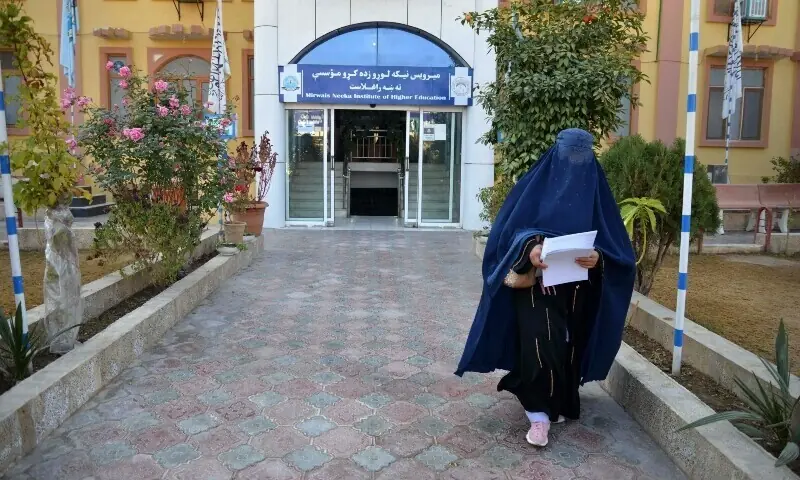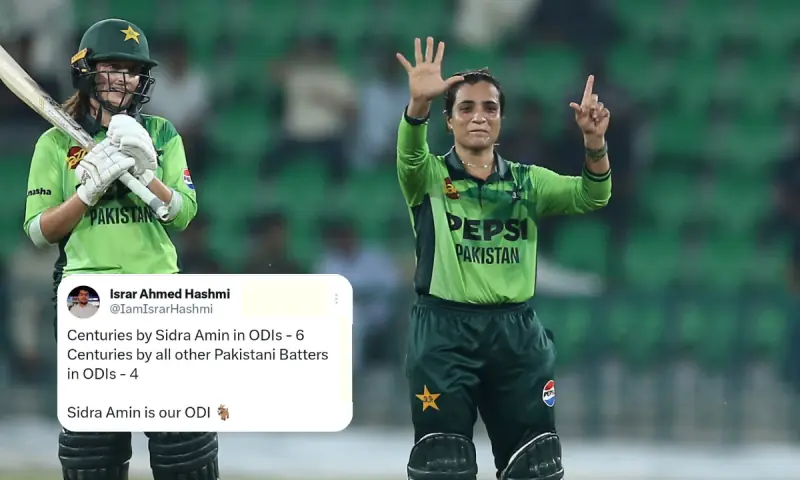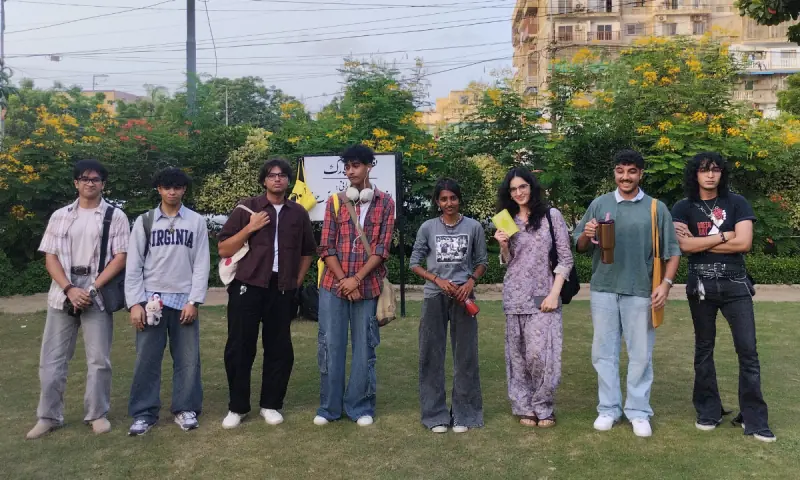Food and feasting humanises cultures like politicians and newspapers never could: Bisma Tirmizi
New novel Feast: With a Taste of Amir Khusro tells the story of Ayesha as she embarks on a quest to appreciate food for all its cultural and historical worth.
Writer Bisma Tirmizi's long-running food column Food Stories finds fresh context in this novel as she places each of her family recipes in the story when her character Ayesha needed to stumble across it.
The novel launches at the Lahore Literary Festival today. Here's what Tirmizi wants readers to know about her book:
Images: Can you tell us about the origins of your book Feast?
Bisma Tirmizi: Food history has always intrigued me, and each time I read a book where food played the super protagonist, it excited me, almost to the point of being irked, I felt I needed to write about food, people, commonality, passion, stories, but just couldn't find the discipline to do the same. And then Anthony Bourdain: Parts Unknown debuted in 2013, and I fell in love with the concept of indigenous foods, different lands, and the feeling of wholesomeness that comes with it.
The same year my mother passed and I found myself lost, and reading Life of Pi on the plane to her funeral. Coincidentally I had bought Life of Pi to read, the year it debuted in 2001, but lost the copy and never read it. Hence to me it was God/fate/higher power (whatever you may want to call it), handing me that novel in that moment, and prompting me to read it.

I came back to the US broken in spirit, and that’s when I saw Julia and Julia. The combination of grief, and the subtle and life-altering experiences of 2013 created an intense urge to connect with home (the sub-continent). This culminated into my column called Food Stories (published in dawn.com). The column became my catharsis, and the cooking process accompanying each Food Story, a journey that nourished and healed me.
Images: Your book offers an in-depth look at the culinary culture of Pakistan, which makes it more than your ordinary 'cookbook'. Was that always your intention? Or did it slowly evolve from cookbook to novel?
Bisma: It reminds me of home and sub-continental traditions, and connects me to my family and friends in the most elemental way. Plus I love the use of spices in our cuisine. Varied, flavourful, exotic, unique, subtle and strong, much like our people. Recipes may be the most integral part of cooking, however having said that, what is more appealing and real is the stories that surround all cuisines.
We may all come from different regions, but are entirely connected through our food experiences. Food brings nostalgia, familial stories, passing of the baton from one generation to the next, and it travels with us; through lands, time and migration.
"I never learnt cooking until I married and moved to the US. And since I was on a perpetual diet until the birth of my third child I did not eat much, but have always loved feeding people. But now I indulge in a lot of good eating myself, and think it to be one of the greatest blessings in life."
Hence the stories and tales surrounding it are as, if not more, elemental and magical, as the ingredients in a recipe. It revolves around people, viewing their evolution or annihilation, and interestingly enough its nourishment means different things to different people, some people live to eat, others eat to live. More than the science of recipes, cooking is the art of the heart; a constant reminder of roots, memories and humanity, and a very supportive companion to the diaspora of the world.
I never learnt cooking before I married, but have always loved food. I learnt to cook, like most desi women, once I moved to the US. And since I was on a perpetual diet until the birth of my third child I did not eat much, but have always loved feeding people. But now I indulge in a lot of good eating myself, and think it to be one of the greatest blessings in life. I love watching cooking shows, and used to love watching them with my mother.

Growing up my parents entertained regularly, and my mom, like all desi moms was the best cook ever. She made mean desi food, Chinese and continental, and my nani was as good, if not better, and shuttling between both homes I had the best desi food. Plus, I had the best neighbourhood aunties growing up. The shami kababs in every household were sublime, and I was always offered them.
Even when I wasn't eating, I had always understood and respected what food had to offer; in terms of taste, right menu combination, nourishment, familial and friendship bonds in sharing, and the romance and sensuality of it all. I’m an absolute fan of desi food, it's my favourite cuisine for sure.
Images: How did you decide on the title of your book'?
Bisma: Food and Feast is a love thing, and food history, feasting with family and friends (and language) is a motherland thing that binds in much the same way as a mother does. Hence we cannot separate one from the other.
"We all have relatives who may have died at birth, as babies or as young children. I do too, hence I made those relatives of mine real characters in the novel, making them fleshed out, with breath and life, and connected them to Ayesha, in much the same relationship, as they were to me."
As an artist it is my responsibility to unite and focus on the commonality of the past and the present, that the nations share. Hence Feast, as a title just seemed appropriate, plus like time and music, feast binds us through generations. Feasting, sharing, cooking, eating, and writing about food humanizes cultures and people like newspapers and politicians never could, and that’s why I do what I do, and that’s why I called it Feast.
As for the tagline `With a Taste of Amir Khusro’, I wanted poetry, qawali, romance, history, sufism to play a supporting role to Feast, and who is sweeter on the ear than Amir Khusro. Plus, as I was researching for the book I stumbled upon the connection between Ziauddin Barani, Nizamuddin Auliya and Amir Khusro, and the love and devotion they shared for one another. Hence I think the title chose me, instead of me choosing it.
Images: Do you have any fun incident to recall when writing this book or practicing these recipes?
Bisma: This book is entirely fictional, but what's true is that I’ve tasted perfect and identical tasting pulao in only two homes, my mother’s and my mother in law’s, and it's the taste of that pulao which inspired me to weave this fictional story.

The most difficult, or maybe fun, part was creating subtle romance. To me a more powerful and effective way of conveying emotions and feelings is when things are implied rather than obvious, hence I stuck to subtle.
As for the obviously fun part, I truly enjoyed researching, cooking and eating the foods I made, which are included in the book. We all have relatives who may have died at birth, as babies or as young children. I do too, hence I made those relatives of mine real characters in the novel, making them fleshed out, with breath and life, and connected them to Ayesha, in much the same relationship, as they were to me. I had a cousin named Iffat, who died at birth, she is a character, and many others like her. To me that was fascinating, I felt I validated them in some way, and made their existence somehow more than a memory.
Images: Do you plan on writing more books like this?
Bisma: Perhaps, why not, this book was most fun to write, let’s see what I come up with next.
Images: Do you have any tips and tricks for the novice starting out with your book? And also, what’s your personal favourite?
Bisma: Yes, I do, listen to qawalis by Amir Khusro when reading this book. Cook each and every food, the recipes are fantastic. As for my personal favourite, mutton pulao, shami kabab and cachumber raita, or mutton dum biryani.











Comments